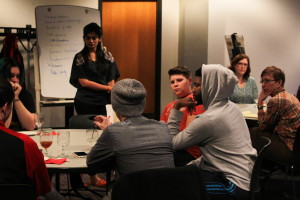By SARA LAWSON
Assistant News Editor
(WARRENSBURG, Mo., digitalBURG) — Minority groups on campus have been gathering in town hall meetings the past four weeks to talk about issues that affect them on campus.

Students gather for a town hall meeting on Wednesday, Feb. 3,
to discuss concerns of the LGBTQ community on campus.
These meetings were organized by the UCM Mentoring, Advocacy and Peer Support office, as a way to hear the opinions of minority groups on campus. Members of the LGBTQ community gathered Feb. 3 to discuss the issues they would like to see addressed at UCM.
“(The meeting) was an opportunity (for) the LGBT students to actually have a conversation with the university about issues,” said Chris Moody, a senior graphic design major. “The staff here actually listened and took notes about it, and I feel like they’re actually going to do something with that.”
Though there was agreement that UCM has organizations like PRISM and Students Advocating Gender Equality for members of the community, the students discussed other concerns, including improvements to campus life.
“I was worried that there wasn’t going to be a way to talk about the gender-neutral housing since that is something that is really important to me,” said Stephen Klee, a junior with an undecided major.
James Moran, coordinator of LGBTQ communication and outreach in the MAPS office, said that a couple goals of these meetings is to provide a safe environment for the students to speak and to express their opinions. Moran said the protests at Mizzou last semester may have been a catalyst for these meetings to occur.
“The fact that Mizzou highlighted for so many people that students have a voice that needs to be heard…we need to actually have a good conversation between students and administration,” Moran said.
James Hanten, junior double major in theater and public relations, offered a piece of advice to the rest of the UCM community.
“Just because we may like the same sex doesn’t mean that we can’t be friends with the same people,” Hanten said. “Treat them with respect, no matter who they are, what they look like or how they act.”
Moody mentioned that everyone on campus can benefit from these town hall meetings.
“(Everyone) knows someone, whether they know it or not, that is in (this) community,” he said. “When you care about something like the (LGBTQ) community, you start to make decisions, especially in wording and things that you say and things that you do, that way you’re not being degrading toward that community.”
The last town hall meeting in this four-week series, focusing on undergraduate international students, was last night.






